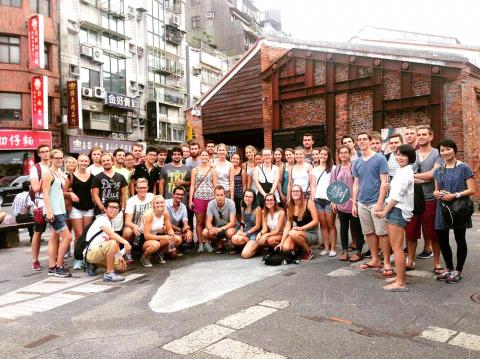When Becky Liu (劉樾) visited the Plum Pavillion (梅亭) in Taipei’s Beitou District (北投), it reminded her of her great-grandfather, who, like the pavilion’s former resident, former Control Yuan president Yu You-jen (于右任), was an expert calligrapher.
“Through this connection, I can tell [tourists] about calligraphy in our culture and what it represents,” she says.
This is one of the personal experiences that local tour guides will relate during Sunday’s Beitou, Hundred Years a day walking tour, organized by Like It Formosa (來去福爾摩沙), formed by a group of twenty-something locals dedicated to a variety of walking tours all conducted in English.

Photo courtesy of Like It Formosa
“We want our guides to not read from a book but to incorporate their personal experiences and serve as storytellers and performers,” says founding member Julia Kao (高于晴). “We want to present to foreigners the perspective of local young people.”
She adds that visitors have joined the same tour multiple times just to hear different tour guides share their experiences.
Formed early last year, Like It Formosa started out last September and October with two pay-as-you-want weekly walking tours of Taipei — a historic one every Thursday that takes people through the old Taipei neighborhoods on the western end, and a modern one every Sunday that shuffles through the bustling East and Xinyi districts from Sun Yat-sen Memorial Hall to 44 South Village (四四南).
They launched their first paid tour in November — an LGBT Taipei one that took visitors to locations such as an LGBT bookstore and Rainbow Sauna (彩虹會館), a 24-hour gay establishment. Sunday’s Beitou tour is their first time taking people to northern Taipei, and they have more tours planned for later this year.
These young Taiwanese aren’t just looking to show foreigners what Taiwan is about. They say it’s also a self-exploration of what it means to be Taiwanese, which is a question local students especially struggle with when asked to present their culture while studying overseas.
“When I went on the tours myself, I felt pretty impacted,” Kao says. “To locals, it’s a chance to get to know Taiwan all over again.”
“When we pass by the Presidential Palace, we can discuss the protests and democracy in Taiwan,” Liu adds. “In Ximen, we can talk about Japanese influence on the city. Through exchanges with tourists, we can in turn ponder deeper questions about where we live.”

Taiwan has next to no political engagement in Myanmar, either with the ruling military junta nor the dozens of armed groups who’ve in the last five years taken over around two-thirds of the nation’s territory in a sprawling, patchwork civil war. But early last month, the leader of one relatively minor Burmese revolutionary faction, General Nerdah Bomya, who is also an alleged war criminal, made a low key visit to Taipei, where he met with a member of President William Lai’s (賴清德) staff, a retired Taiwanese military official and several academics. “I feel like Taiwan is a good example of

March 2 to March 8 Gunfire rang out along the shore of the frontline island of Lieyu (烈嶼) on a foggy afternoon on March 7, 1987. By the time it was over, about 20 unarmed Vietnamese refugees — men, women, elderly and children — were dead. They were hastily buried, followed by decades of silence. Months later, opposition politicians and journalists tried to uncover what had happened, but conflicting accounts only deepened the confusion. One version suggested that government troops had mistakenly killed their own operatives attempting to return home from Vietnam. The military maintained that the

Before the last section of the round-the-island railway was electrified, one old blue train still chugged back and forth between Pingtung County’s Fangliao (枋寮) and Taitung (台東) stations once a day. It was so slow, was so hot (it had no air conditioning) and covered such a short distance, that the low fare still failed to attract many riders. This relic of the past was finally retired when the South Link Line was fully electrified on Dec. 23, 2020. A wave of nostalgia surrounded the termination of the Ordinary Train service, as these train carriages had been in use for decades

Lori Sepich smoked for years and sometimes skipped taking her blood pressure medicine. But she never thought she’d have a heart attack. The possibility “just wasn’t registering with me,” said the 64-year-old from Memphis, Tennessee, who suffered two of them 13 years apart. She’s far from alone. More than 60 million women in the US live with cardiovascular disease, which includes heart disease as well as stroke, heart failure and atrial fibrillation. And despite the myth that heart attacks mostly strike men, women are vulnerable too. Overall in the US, 1 in 5 women dies of cardiovascular disease each year, 37,000 of them